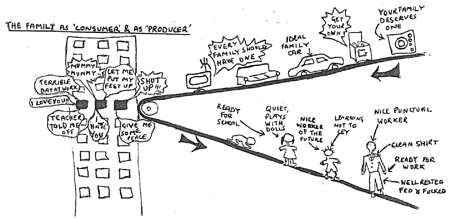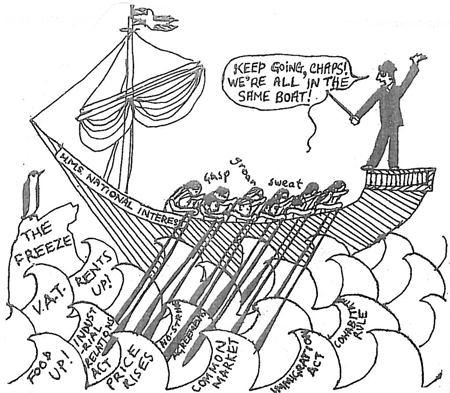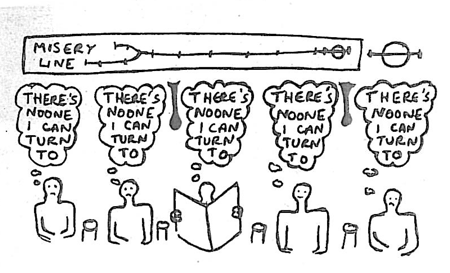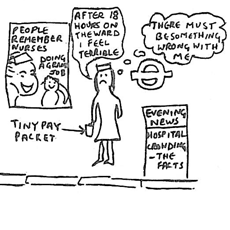Who we were
We were a fluid group of about a dozen young women and men who came together in east London. We probably would have described ourselves as left libertarians. We organised in the community, in workplaces, around class, racism, women’s and men’s issues, for personal change/self-help therapy, and against bias in the media. We saw ourselves not as outside, but as part of these struggles, and saw the links between these different issues as embodying politics in everyday life.
From 1973–5 we belonged to a nationwide grouping called‘Big Flame’ (www.bigflameuk.wordpress.com). Our projects carried on until the early 1980s, and after that we dispersed and took our ideas and values into different areas of work (teaching; architecture; psychotherapy; archaeology; local government; film-making; writing) as well as into continuing political and community activism.
Background
 Our activism was set against the
background of East London in the early 1970s. There was a tradition of
working-class militancy, strong trades unions and tenants’ unions, and a history
of some victories won. But the traditional forms of organising on the Left did
not address the needs of women, black people and the unemployed; nor did they
accommodate new forms of political action like squatting, Claimants’ Unions and
the women’s movement. Reacting to what we saw as out-dated structures on the
Left, we were trying to develop new models of working and living and
organising. We saw ourselves as building on the New Left theories of the
feminist movement and organisations like Solidarity (the UK one), the
Libertarian Socialist network, and Lotta Continua in Italy, and bringing these
into ‘the struggle’ (see Transforming Capitalism and the Politics of
Everyday Life). We saw ourselves as developing an awareness drawn from
everyday activism and re-interpreting in the light of our own experience the
political theories of Karl Marx, Antonio Gramsci, Maria Rosa della Costa, Rosa
Luxemburg, Franz Fanon, Guy Debord, Raoul Vaneigem and Wilhelm Reich (see
Influences pages on this site)
Our activism was set against the
background of East London in the early 1970s. There was a tradition of
working-class militancy, strong trades unions and tenants’ unions, and a history
of some victories won. But the traditional forms of organising on the Left did
not address the needs of women, black people and the unemployed; nor did they
accommodate new forms of political action like squatting, Claimants’ Unions and
the women’s movement. Reacting to what we saw as out-dated structures on the
Left, we were trying to develop new models of working and living and
organising. We saw ourselves as building on the New Left theories of the
feminist movement and organisations like Solidarity (the UK one), the
Libertarian Socialist network, and Lotta Continua in Italy, and bringing these
into ‘the struggle’ (see Transforming Capitalism and the Politics of
Everyday Life). We saw ourselves as developing an awareness drawn from
everyday activism and re-interpreting in the light of our own experience the
political theories of Karl Marx, Antonio Gramsci, Maria Rosa della Costa, Rosa
Luxemburg, Franz Fanon, Guy Debord, Raoul Vaneigem and Wilhelm Reich (see
Influences pages on this site)
The politics of everyday life was a phrase much used by us and others in the 70s. It refers to the idea that politics is not only about wages and work – the traditional activism issues of the time – but it is also about food and energy prices, housing and rents, childcare, personal relationships, sexuality, ways of living together, health, the family, and the lack of paid work. We understood that capitalist oppression not only happens through exploitation at work and the pay packet. Rising prices for food and rents affected how much money we had to spend as much as wage levels – and so we campaigned and organised around those issues too.
The ‘social wage’ refers to the idea that the value and significance of services that we pay for in our taxes, such as education, council housing, transport, the health service, libraries etc are absolutely critical to our quality of life, especially for women, children and older people who were not earning a wage, or are very low paid. Reductions in those services are as much an attack on working class people as wage cuts. This was a viewpoint that socialist feminists campaigned for.
We critiqued the way that such services were delivered – they reinforced the nuclear family, gender roles, men as the breadwinner, school for the production line, heterosexuality, racism; they were authoritarian and judgmental. We demanded that services took account of how we wanted to live, rather than reproducing a passive and obedient workforce; this was part of the politics of autonomy (see Thinking Autonomy).
We challenged the very narrow view of ‘the working class’, and argued for a wider perspective on class struggle to include struggles about racism, gender, disability etc. As heavy manufacturing industry and its union base was decimated under Thatcher, some of struggles which we had championed made progress; at the same time the pressure was for those 'identity' issues to become detached from class and become part of the neo-liberal discourse of lifestyle and choice.

How we started and ended
Central to the East London Big Flame group was the Mile End collective, which began in 1973 when six activists moved to Bow (some squatting, some jointly putting down money on a house), and joined up with others already in the area to form ELBF. In 1974 the collective squatted another empty house to run our playgroup in, and as numbers grew we spread into a rented shared house and, later, another squat. Some of us had children and we shared childcare and took turns cooking. Some of us were working, some unemployed. Two women who were squatting further north, in Hackney, joined the ELBF group.
The many initiatives we were involved in from 1973 onwards are documented on this website. In our activism we did not prioritise workplace struggles like some other left groups. We saw that capitalist production had increasingly invaded areas of social life (such as the home, schools, social services and leisure) and that work and family were both in effect playing a role in one process, the ‘social factory’. So, starting from a campaign about prices, by mid-1974 we had initiated the Food Co-op based on the local Lincoln Estate; and were active around ‘Redevelopment’, Housing and Squatting issues locally including – with others – in groups organising around mass squatting. We were active Countering Racism, Fascism, Imperialism and literally fought the National Front on the streets of east London. Some of us were unemployed and were involved around Claimants and Non-Employed People. Some of us campaigned on issues around Education and the Youth, including against the closure of a local school.
Some of us were involved in factory work-based activism, both Organising at Fords and Organising in a Womens’ Factory (at Lesneys, making toy cars). Some were active unionising local building sites and in a Building Workers’ Campaign to defend the victimised Shrewsbury pickets. We set up a leaderless group called Red Therapy on the premise that ‘the personal is political’. Some of us were also working with others outside Big Flame around Countering Media Bias. The women were involved in addressing Women’s Issues (including organising with others around women’s aid, women’s health, abortion, rape and childcare), and the men were active around Men, Anti-sexism and Achilles Heel (this last was an anti-sexist journal for men that they started).
In the mid to late 70s we also produced pamphlets, films, magazines and a book, all reflecting various aspects of our practice. For example, the Food Co-op and the group of women Organising in a Women’s Factory produced pamphlets about what they did. The men who had started a men’s group produced the men’s movement magazine Achilles Heel into the 1980s. The leaderless therapy group produced a 60-page Red Therapy pamphlet about that activity, and two of the group wrote a book about self-help therapy. Group members active Countering Media Bias produced an 80-page radical guide to broadcasting, the TV Handbook, and – helping form the Newsreel Collective – produced a series of short films with accompanying pamphlets. These were mostly for young people around issues like racism, sexism and unemployment.
Some of these were our initiatives, but many were actions of the time that others were initiating and leading. We were a ‘porous’ group and almost always worked alongside others who were not in Big Flame: we saw the group as providing a focus for ‘linking up’ these struggles – not as leadership, but more as providing a space for discussion and analysis. Our ideas about Organising Non-hierarchically drew on Italian writings about autonomy rather than beliefs in the need for a ‘party’. More general reading is listed under Influences. We also include some of our Personal Stories.
Being porous as a group was both a strength and a weakness. We never coalesced into a real force, but influenced all kinds of activities. And – while some members of Left ‘parties’ become burnt out or reactionary – we have carried on being active along the same lines. We’re not saying our way of doing things is the ‘correct’ or only way, but maybe it’s a model for organizing that is coming into its own at the moment, and we need to reflect on it.
After leaving Big Flame in 1975 we carried on with many of the same activities and started some new ones. We took part in the picket lines at Grunwick in 1977, supporting the immigrant women workers’ right to join a trade union. We housed the miners who came to join them on the picket line.
Around 1978, people were moving from Mile End into other places in east and north London or Sheffield. As the Thatcher years closed in and more of us had children, we focused increasingly on taking our politics into where we were working. Those formative years of intense activism were variously remembered, regretted, criticised or treasured in our minds, but never forgotten, as described in the Personal Stories on this web site.
Why did we run out of steam? We probably all have different versions. There were the obvious reasons: that the Labour Party never seized on the mood for change, nor had a language to encompass it, and in the vacuum the Right were driving the agenda and playing successfully to people’s fears; that social change anyway is slow; that we were exhausted; that our interest in personal politics was uncomfortable in Big Flame nationally, and in the end led to our withdrawal from BF; that the internal sexual tensions to some degree fractured the group; that having and bringing up children took an increasing share of our energy and attention. And finally that we had begun to individuate, that in this extraordinary time we had each gotten a little clearer about what we wanted to do with our lives, over and above serving the wider vision.

Making this website
In making this web site, we have much enjoyed seeing one another again after these many years, reflecting on our time together, correcting old misapprehensions and renewing our collaboration. That we have maintained goodwill and respect is testimony to our emphasis on personal politics in that period.
Most Left history is allowed to wither away, and our various pamphlets and other creations from that period mostly disappeared into cardboard boxes. Making this site has been a way of bringing them out into the light again and offering them to a new generation.
Bear in mind that the haphazard typing and crude lay-outs in our documents from that time were not a stylistic choice: all the documents/activities presented on the web site were done at a time without smart phones, without word-processing, without photo-shop, without internet. Manual and electric typewriters, pen & ink, stencils, offset litho, and Gestetner duplicating machines were the order of the day. And those urine-smelling red phone boxes.
In other ways too the documents (see full List of Original Documents) reflect a different world: at that time you could still carry out the struggle against capitalism at the factory gates; neo-liberalism was not on our minds; the military/industrial complex and banks did not feature so prominently as part of economic and cultural life; and environmental issues had not yet come to the fore. What can sound to contemporary ears like pompous and omnipotent language was also part of the ethic of the era… We’re not saying what we did was perfect. All we’re saying is ‘This is what we did’; the absence of some ideas is interesting in itself – and other ideas still seem to hold strong forty years later.
